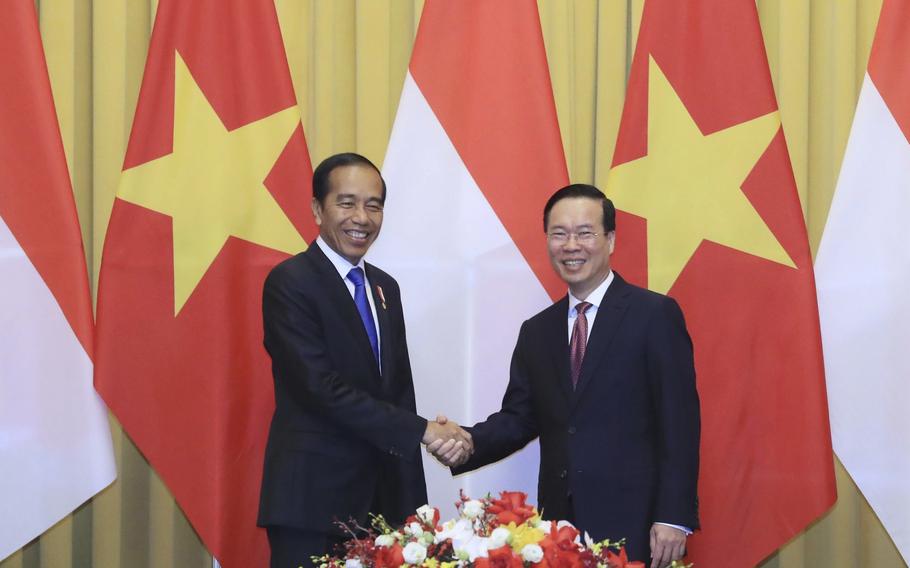
Vietnamese President Vo Van Thuong, right, and Indonesian President Joko Widodo shake hands before a meeting in Hanoi, Vietnam, Friday, Jan. 12, 2024. (Hoang Thong Nhat/VNA)
A nation of 280 million people, spread across many islands in a region larger than the United States, Indonesia will host nationwide elections on Feb. 14. In addition to a presidential election, 20,000 parliamentary seats will be determined with a quarter of a million candidates vying for elective office. It appears that democracy is alive and well in the Southeast Asian republic.
Three hopefuls have emerged as leading contenders for president of the populous country: Ganjar Pranowo, former governor of Central Java; Prabowo Subianto, former general and current defense minister; and Anies Baswedan, former governor of Jakarta, are each presenting themselves as the best choice for the highest office in the land.
The president they will be succeeding is the immensely popular Joko Widodo (Jokowi). If not limited to two terms by Indonesia’s constitution, Jokowi’s popularity could easily propel him to a third victory. There have been calls from within the country to change the constitution and remove the two-term limit, but the sitting president is opposed to the measures, citing the long-term implications for democracy in Indonesia.
In 2023, Jokowi turned to his own Indonesian Democratic Party of Struggle (PDI-P) to select a suitable candidate to succeed him. Ganjar won the nomination but has since lost both the confidence of those who nominated him and Jokowi himself. Once in a slim first-place polling lead at 37%, Ganjar’s less-than-spectacular debate performances and poor decisions have resulted in him becoming the least desirable candidate with just 16% support.
The most blatant illustration of the presidential aspirant’s deficient decision-making involved world soccer’s governing body, the Fédération Internationale de Football Association (FIFA), and the 2023 U-20 championship games, which were scheduled for Indonesia. Well before the Gaza attacks, Ganjar refused to host the Israeli team. The then-governor’s religious bigotry led to FIFA stripping the country of its opportunity to host the championships, resulting in Indonesia’s business and tourism industries losing a quarter of a billion dollars.
Lack of confidence in Ganjar subsequently caused democracy advocates Jokowi and Budiman Sudjatmiko to endorse a well-known quantity and sitting cabinet official, Prabowo. Though he was defeated by Jokowi in 2014 and 2019, Prabowo agreed to serve as Indonesia’s defense minister following his second loss.
Since that time, Prabowo’s judgment, counsel and actions have resulted in him becoming the most respected member of Jokowi’s Cabinet. Neither has the defense minister’s third attempt at the presidency diminished the public’s enthusiasm for his candidacy with public support for his ascension surging from 36% to between 49% and 52% in recent straw polls.
Recent presidential debates have also led to the leader’s rise. By assuring the public that he would build upon Jokowi’s accomplishments, Prabowo has resonated with the Indonesian public by discussing ways to improve citizens’ lives throughout the archipelago and demonstrating that he recognizes the interdependence between a robust economy and a strong national defense. As a candidate, he has made clear that he will work to promote international trade while keeping the country out of unnecessary foreign entanglements involving the great powers.
Also contributing to his surge is Prabowo’s selection of Jokowi’s son Gibran Rakabuming Raka as his vice presidential running mate. As mayor of Solo and a successful entrepreneur, the 36-year-old Gibran brings a direct connection to Indonesia’s millennial voters. Younger voters appear to be intensely supportive of the Prabowo-Gibran ticket. It is clear that many of these voters realize that, now in his 70s, Prabowo may be running his last campaign, but that Gibran will carry his father’s vision for Indonesia into the next generation.
Anies has risen to second place at 24%. Fluctuating around 10% are undecided voters who appear to be the determining factor in whether the race will be settled in the first round. Pursuant to the Constitution, failure to win with at least 50% would require a June runoff. Such a referendum would cost Indonesians over $1.4 billion that could be better spent servicing the country’s citizens. But with opinion polls indicating that Prabowo’s popularity is on an upswing, securing a majority of the vote next month may be within reach.
It is easy to understand why Indonesians would be excited at the prospect of Prabowo’s victory. His election would have a positive impact not just in Indonesia, but also the globe. As minister of defense, the presidential hopeful is already working on the world stage the doorstep of which begins at Indonesia’s northern shorelines. Just 40 miles wide at its narrowest point, the Strait of Malacca runs between Indonesia and Malaysia. At the east end is the island country of Singapore, followed by the South China Sea. To the west is the Indian Ocean. Known as the “Maritime Silk Road,” a quarter of all global shipping, including oil, is transported through the strait. Security of the passage is of paramount importance and a stable government led by someone who understands regional defense and stability is crucial to international peace and security.
Regional defense and economic stability are anchored in the Association of Southern Asian Nations (ASEAN) — whose members include Brunei, Cambodia, Indonesia, Laos, Malaysia, Myanmar, Philippines, Singapore, Thailand and Vietnam — with Indonesia’s capital city of Jakarta serving as ASEAN’s diplomatic capital.
With Indonesia in a critical leadership role in the region, and for the welfare of their own country, Indonesians are increasingly acknowledging Prabowo as their best choice for president in 2024. By embracing this choice, U.S. and European authorities can help to advance the republic’s short-term stability while cultivating leadership capacity for its longer-term success.
Ivan Sascha Sheehan is the associate dean of the College of Public Affairs and past executive director of the School of Public and International Affairs at the University of Baltimore. Opinions expressed are his own.